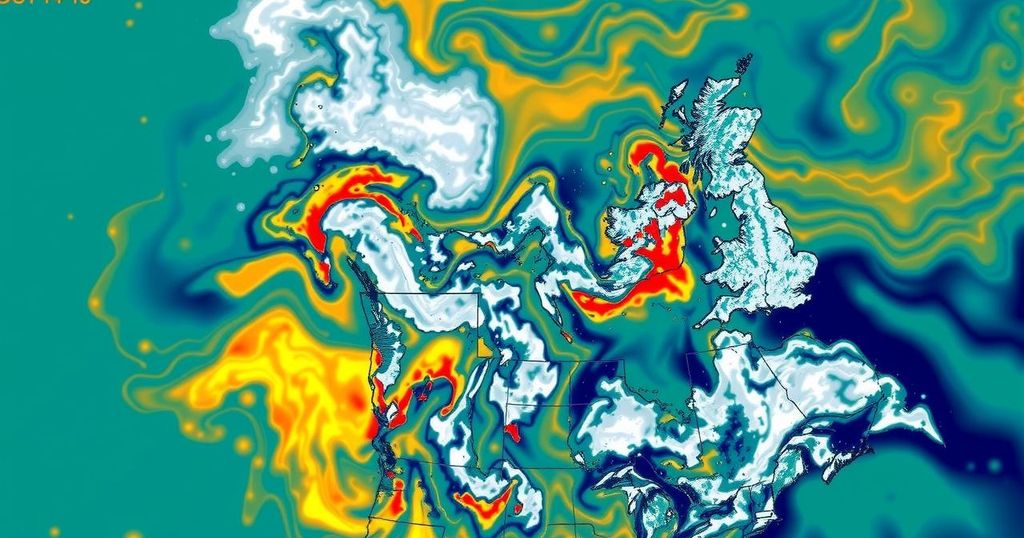Week in Review: Key Climate Developments from October 14-18, 2024
This week’s climate news highlights that only 2.8% of the ocean is effectively protected, points to the politicization of disaster aid during the Trump administration, links climate change to deadly floods in Nepal, showcases Google’s steps toward nuclear energy, reveals emotional responses from meteorologists about hurricanes, and uncovers widespread climate anxiety among American youth across political divides.
This report for the week of October 14-18, 2024, encapsulates crucial developments in climate news, highlighting alarming statistics regarding ocean protection, the politicization of disaster aid during the Trump administration, the connection between climate change and recent tragedies in Nepal, innovative energy solutions being explored by Google, emotional responses from meteorologists regarding extreme weather events, and the rising climate-related distress among American youth across political affiliations. 1. Despite a collective commitment by over 190 nations to enforce the Kunming-Montreal Global Biodiversity Framework, which aims for 30% of areas to be effectively conserved by 2030, new findings reveal that a minuscule 2.8% of the world’s oceans are classified as ‘effectively’ protected. This poses significant challenges in achieving biodiversity conservation objectives outlined in the framework before the target date. 2. Reports surfaced that former President Trump initially withheld disaster aid for states predominantly governed by Democrats after destructive wildfires in California from 2018, a decision that was later reversed when it was shown that some of the hardest-hit areas contained significant Republican support. This politicization of disaster response raises concerns about future aid distribution and its impacts on disaster-stricken communities. 3. A scientific analysis has confirmed that climate change significantly intensified the extreme rainfall that resulted in devastating floods in Nepal last month, killing 244 individuals. The study suggests that such extreme rainfall events are becoming more likely due to human-induced climate change. 4. In a groundbreaking move, Google has partnered with Kairos Power to build small modular nuclear reactors (SMRs) intended to supply energy to its data centers. This initiative marks a notable step toward reducing its carbon footprint, as Google aims to procure 500 MW of carbon-free energy by the early 2030s. 5. Renowned meteorologist John Morales expressed profound frustration and sadness over the inadequate responses to climate change, exemplified by the intense Hurricane Milton. His emotional plea emphasized the urgency of taking comprehensive action to mitigate the effects of climate change. 6. A recent survey conducted among young Americans has revealed widespread climate anxiety, with 85% of respondents expressing moderate to extreme worry about climate change. Notably, the distress appears to transcend political lines, indicating a collective concern for the environment and future sustainability regardless of party affiliation.
The significance of this report is underscored by the global urgency in addressing climate change and its multifaceted impacts. The new statistics on ocean conservation reveal troubling gaps between global commitments to environmental protection and actual progress. Furthermore, the politicization of disaster aid demonstrates how climate disasters can intersect with political agendas, complicating humanitarian responses. Scientific analyses linking climate change to natural disasters like flooding in Nepal emphasize the real-world consequences of inaction. Meanwhile, innovative approaches, such as Google’s investment in nuclear energy, represent efforts by corporations to reduce their environmental impact. Lastly, the emotional responses from both meteorologists and young individuals spotlight the psychological toll of climate change, reinforcing the need for effective policies and actions.
In summary, the week of October 14-18, 2024, reflects a landscape fraught with both challenges and proactive measures regarding climate change. Key highlights include concerning statistics on ocean conservation efforts, the politicization of disaster aid, scientific findings linking climate events to human-induced climate factors, corporate investments in sustainable energy, and growing emotional distress among the youth concerning climate issues. These elements collectively demonstrate the pressing need for unified global action to mitigate climate change and protect both ecosystems and communities.
Original Source: earth.org




Post Comment